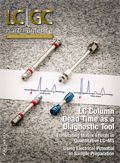Peaks of Interest
The Australian Patent Office has granted a patent related to W. R. Grace & Company's (Columbia, Maryland) Reveleris flash chromatography system.
Patent Granted for Flash Chromatography Technology
The Australian Patent Office has granted a patent related to W. R. Grace & Company's (Columbia, Maryland) Reveleris flash chromatography system. The patent concerns the use of evaporative light scattering detection (ELSD) with flash chromatography. The technology covered in this allowed claim enables streamlined purification of new chemical and biological entities for drug discovery.
Grace previously received similar U.S. patents related to various aspects of flash chromatography using two kinds of detectors, such as ELSD and UV, to collect sample fractions. These techniques improve new molecule purification by increasing recovery, improving reliability, and simplifying instrument operation.
Chris Reddy Receives Award for Oil Spill Research
Chris Reddy, a marine geochemist at the Woods Hole Oceanographic Institution (WHOI) (Woods Hole, Massachusetts), has been selected to receive the 2014 Clair C. Patterson Award from the Geochemical Society. The award recognizes one scientist a year who has made an innovative breakthrough in environmental geochemistry in service to society.
Reddy was nominated for the award because of his work on developing and applying advanced chromatographic and spectrometric techniques to identify the source, transport, and fate of petroleum hydrocarbons in the coastal and open ocean. The award will be presented at Goldschmidt2014 (Sacramento, California) in June 2014.
"One of my overarching interests in studying oil spills is that there are compounds in oil that seem to persist a very long time while there are others that can disappear quickly. I find it fascinating that a spectrum like this exists," said Reddy. He added: "Clair C. Patterson was a tenacious trailblazer in studying lead and lead pollution. For me to be associated with him is, quite frankly, humbling."
Jeff Seewald, chair of WHOI's Department of Marine Chemistry and Geochemistry said: "His application and development of innovative analytical approaches have resulted in a quantum leap in our ability to predict the persistence of anthropogenic and naturally occurring petroleum in the marine environment."
Seewald added: "Chris is motivated by a strong desire to understand the consequences of human activity on the environment and has a special gift for communicating relevant information to the scientific community, policy makers, and the general public."

A Novel LC–QTOF-MS DIA Method for Pesticide Quantification and Screening in Agricultural Waters
May 8th 2025Scientists from the University of Santiago de Compostela developed a liquid chromatography quadrupole time-of-flight mass spectrometry (LC–QTOF-MS) operated in data-independent acquisition (DIA) mode for pesticide quantification in agriculturally impacted waters.
Investigating 3D-Printable Stationary Phases in Liquid Chromatography
May 7th 20253D printing technology has potential in chromatography, but a major challenge is developing materials with both high porosity and robust mechanical properties. Recently, scientists compared the separation performances of eight different 3D printable stationary phases.

.png&w=3840&q=75)

.png&w=3840&q=75)



.png&w=3840&q=75)



.png&w=3840&q=75)








